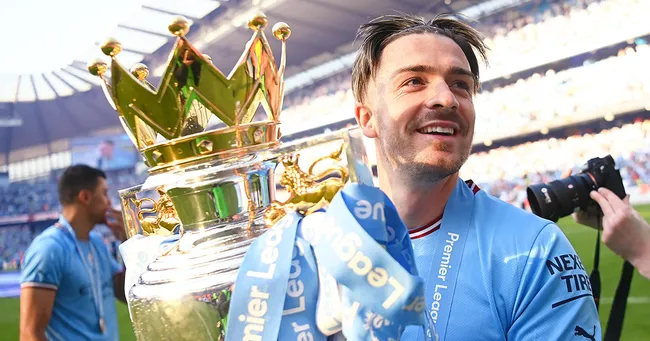
Jack Grealish, one of England’s most talented and high-profile footballers, seems to be caught in a challenging phase of his career at Manchester City. Since his record-breaking £100 million transfer from Aston Villa in the summer of 2021, the gifted playmaker has struggled to find his footing at the Etihad Stadium. Despite occasional flashes of brilliance, his performances have often failed to justify the massive price tag, leaving fans and pundits questioning whether the move was truly the right fit for both player and club.
Now, two and a half seasons into his stint with Pep Guardiola’s side, the question looms larger than ever: Is it time for Manchester City and Jack Grealish to part ways?
When Grealish arrived at City, expectations were sky-high. The player had just enjoyed a stellar period at Aston Villa, where his creativity, flair, and ability to unlock defenses with a single pass or dribble made him one of the Premier League’s standout stars. He was not just a footballer at Villa Park; he was their talisman, their leader, and a homegrown hero. His departure to Manchester City marked the end of an era for Villa and the beginning of what many believed would be a glittering chapter in Grealish’s career.
However, the transition has been anything but smooth. At Aston Villa, Grealish was the centerpiece of the team. The entire system was built around his strengths, allowing him the freedom to roam, create, and dictate the tempo of the game. At Manchester City, the dynamic is entirely different. Guardiola’s system is built on collective strength, positional discipline, and tactical intricacy. It’s a setup that demands precision and adaptability, where individual brilliance must seamlessly integrate into the larger framework. For Grealish, this has proved to be a difficult adjustment.
The stats tell part of the story. Grealish’s goal and assist numbers at City have been underwhelming compared to his final seasons at Villa. In his debut campaign with City, he managed just six goals and four assists across all competitions, a far cry from the prolific output expected of a £100 million player. While it’s true that Guardiola often prioritizes contributions that don’t show up on the stat sheet—such as pressing, maintaining possession, and creating space—it’s clear that Grealish’s performances have not had the consistent impact many anticipated.
The current season has done little to alleviate concerns. While Grealish has shown occasional glimpses of his immense talent, including some crucial contributions during City’s treble-winning 2022-23 campaign, he has struggled to make a lasting impression. His tendency to slow down play and rely on lateral passes has drawn criticism, particularly in a team known for its quick transitions and ruthless efficiency in the final third. More concerningly, Grealish seems to lack the confidence and swagger that defined his game at Aston Villa.
The issue, however, isn’t just about Grealish’s performances. It’s also about fit. At City, the wide attacking roles are fiercely competitive, with players like Bernardo Silva, Phil Foden, Riyad Mahrez (before his departure), and now Jeremy Doku offering different skill sets. Grealish, despite his undeniable talent, often looks like a square peg in a round hole. His style of play, characterized by drawing fouls, holding onto the ball, and operating in tight spaces, doesn’t always align with Guardiola’s high-tempo philosophy.
For Grealish, this mismatch has led to frustration. Reports suggest that he has struggled to adapt to Guardiola’s demanding coaching style, which emphasizes tactical discipline over individual expression. While Guardiola has publicly defended Grealish on multiple occasions, it’s evident that the player’s natural instincts are often at odds with the system he’s been asked to operate in.
For Manchester City, the question becomes whether they can afford to persist with a player who, despite his potential, hasn’t delivered on a consistent basis. Guardiola’s teams are built to win, and every player is expected to contribute to that goal. If Grealish continues to underperform, it may be in the club’s best interest to consider cutting their losses and reinvesting in a player who better suits their system.
For Grealish, a move away from City could provide the opportunity to rediscover the form and confidence that made him one of the most exciting players in the Premier League. A return to a club where he can play a more central role, free from the constraints of Guardiola’s tactical demands, might be exactly what he needs to reignite his career. Clubs like Newcastle United, Arsenal, or even a move abroad to Serie A or La Liga could offer him a fresh start and a platform to thrive.
It’s worth noting that Grealish’s struggles are not entirely his fault. Moving to a club like Manchester City comes with immense pressure, and adapting to Guardiola’s methods is notoriously challenging, even for experienced players. Grealish deserves credit for his effort and commitment, but the reality is that not every player is suited to City’s unique demands.
As the January transfer window approaches, the situation could reach a tipping point. While City have the resources to be patient with Grealish, they may also recognize the value of recouping some of their investment and bringing in a player who can make a more immediate impact. For Grealish, a move could be a chance to reclaim his identity as a player and rebuild his reputation as one of the league’s elite talents.
Ultimately, the decision to part ways would not be an indictment of Grealish’s ability or potential. Rather, it would be an acknowledgment that sometimes, even the most high-profile transfers don’t work out as planned. For both Grealish and Manchester City, a clean break might be the best path forward—a chance to move on and thrive in environments that better suit their respective ambitions.
Leave a Reply